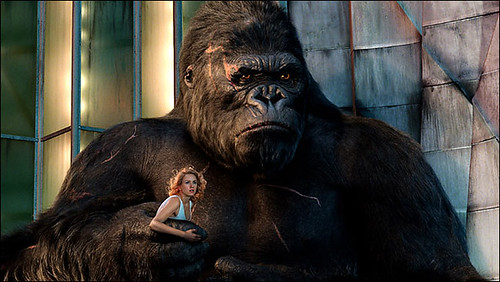
For a film that is basically the cinematic equivalent of a roller coaster ride, King Kong is surprisingly effective, making the Indiana Jones series, for example, seem as creaky & old-fashioned as King Kong’s 1933 original on which Peter Jackson has lovingly based this remake. The new version has been well-received critically – four stars from Roger Ebert, no less – and both are now listed among the top 250 rated films of all time at the Internet Movie DataBase, with the new version coming in considerably higher than the original.
Much of what makes is the new film work is not simply Jackson’s magic with CGI effects – there is nothing here technically that you haven’t seen already in Lord of the Rings, save possibly the scene in which Lumpy the cook is devoured by something that appears to have wandered over from a Tremors remake – nor in Andy Serkis’ continuing mastery of non-human roles. What fills the screen and dominates this film from first scene to last is the luminous presence of Naomi Watts.
Watts is a tremendous actress, as anyone who ever saw Mulholland Drive must realize. Here, she plays Ann Darrow as if the soul of Harrison Ford has dropped into the body of Marilyn Monroe. She’s not at all the passive screamer of Fay Wray in the original. Indeed, the scene in which she confronts Kong on the streets of New York – new to this version – is one of the film’s best, recalling as it does gunfight sequences from any number of American westerns as well as the seductiveness of Mae West. Wearing more clothing than Wray does in the original – the scene in which Kong removes her garments is not repeated here – Watts has to make an amazing range of different kinds of scenes all work, from physical comedy to action to romance. In one scene on the tramp steamer, Watts even has to parody Kate Winslet from Titanic, and does so just enough to let us see the echo without ever stepping out of character. Perhaps most importantly, Watts is the one actor in the film who successfully plays against both Jack Black, whose version of movie director Carl Denham is a cross between young Orson Wells & Phil Silvers, and love interest Adrian Brody, a much quieter, more sensitive actor whose scale in a scene is completely at odds with the broad comedic gestures (even muted as they are here) of Black. This film works because Watts makes it work. King Kong is almost a master class in the number of ways one character, and one actor, can function in a film, and Watts is completely equal to the challenge.






